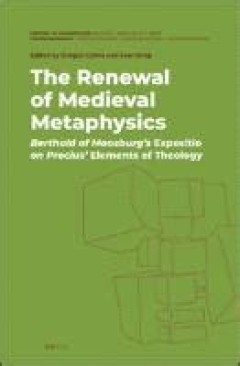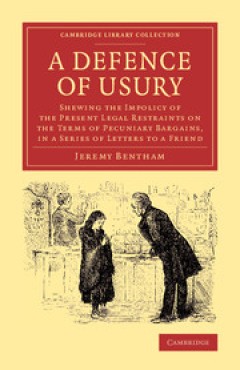Filter by

Un piccolo esempio. La psicagogia matematica di Platone
‘Let me give you a simple example of what I mean, and you will see the rest for yourself.’ This is how Plato usually introduces mathematical examples to illustrate important philosophical puzzles. The research presented in this book offers a systematic analysis of these examples and demonstrates their crucial psychagogical function. Providing a toolkit of paradoxical objects that challenge …
- Edition
- -
- ISBN/ISSN
- '9789004701472
- Collation
- 224 hlm; ill., lamp.,
- Series Title
- Brill's Plato Studies Series, Volume: 18
- Call Number
- -

Truth and Responsibility: A Personalist Reading of Newman
This book goes beyond a simple study of Newman’s thought and work and seeks to apply his deductions to modern value conflicts. Although it will be of particular relevance to academic readers with some prior knowledge of Newman’s works, it may also be of wider interest to students of history, philosophy, theology and spirituality. More generally, its unusual focus on Newman’s epistemology …
- Edition
- -
- ISBN/ISSN
- 9789004682818
- Collation
- 244 hlm; ill., lamp.,
- Series Title
- -
- Call Number
- -

Ways of the Scientific World-Conception. Rudolf Carnap and Otto Neurath
Rudolf Carnap (1891-1970) and Otto Neurath (1882-1945) had a decisive influence on the development of the scientific world view of logical empiricism. Their relationship was marked by mutual intellectual stimulation, close collaboration, and personal friendship, but also by controversies that were as heated as they were rarely fought out in public. Carnap and Neurath were, in the words of Olga …
- Edition
- -
- ISBN/ISSN
- 9789004680203
- Collation
- 380 hlm; ill., lamp.,
- Series Title
- Studien zur Österreichischen Philosophie, Volume: 50
- Call Number
- -

The Renewal of Medieval Metaphysics = Berthold of Moosburg’s Expositio on P…
This is the first volume exclusively devoted to the Expositio by Berthold of Moosburg (c.1295-c.1361) on Proclus’ Elements of Theology. The breadth of its vision surpasses every other known commentary on the Elements of Theology, for it seeks to present a coherent account of the Platonic tradition as such (unified through the concord of Proclus and Dionysius) and at the same time to consolida…
- Edition
- -
- ISBN/ISSN
- 9789004471023
- Collation
- 520 hlm; ill., lamp.,
- Series Title
- History of Metaphysics: Ancient, Medieval, Modern, Volume: 2
- Call Number
- -

A History of Aesthetic
After more than ten years teaching ancient Greek history and philosophy at University College, Oxford, the British philosopher and political theorist Bernard Bosanquet (1848–1923) resigned from his post to spend more time writing. He was particularly interested in contemporary social theory, but he was also concerned with philosophical questions about art and aesthetics. In this area, Bosanqu…
- Edition
- -
- ISBN/ISSN
- 9781139136488
- Collation
- -
- Series Title
- Cambridge Library Collection - Philosophy
- Call Number
- -

Chapter 12 Bridging the Divide Imagining Across Experiential Perspectives
Ch. 12 Can one have imaginative access to experiential perspectives vastly different from one s own? Can one successfully imagine what it s like to live a life very different from one s own? These questions are particularly pressing in contemporary society as we try to bridge racial, ethnic, and gender divides. Yet philosophers have often expressed considerable pessimism in this regard. It is o…
- Edition
- -
- ISBN/ISSN
- 9780367480561,
- Collation
- Pages 24
- Series Title
- -
- Call Number
- 303 KIND c

A Combinatorial Theory of Possibility
David Armstrong's book is a contribution to the philosophical discussion about possible worlds. Taking Wittgenstein's Tractatus as his point of departure, Professor Armstrong argues that nonactual possibilities and possible worlds are recombinations of actually existing elements, and as such are useful fictions. There is an extended criticism of the alternative-possible-worlds approach champion…
- Edition
- -
- ISBN/ISSN
- 9781139172226
- Collation
- -
- Series Title
- -
- Call Number
- -

A Defence of Usury
The utilitarian philosopher and jurist Jeremy Bentham (1748–1832) argues in this collection of letters for the cessation of government control of the rate of interest. The work first appeared in 1787 and is reissued here in the version published in Dublin in 1788. The final letter, addressed to Adam Smith, is a response to Smith's Wealth of Nations (1776), arguing against the limits to invent…
- Edition
- -
- ISBN/ISSN
- 9781107358447
- Collation
- -
- Series Title
- -
- Call Number
- -
 Computer Science, Information & General Works
Computer Science, Information & General Works  Philosophy & Psychology
Philosophy & Psychology  Religion
Religion  Social Sciences
Social Sciences  Language
Language  Pure Science
Pure Science  Applied Sciences
Applied Sciences  Art & Recreation
Art & Recreation  Literature
Literature  History & Geography
History & Geography